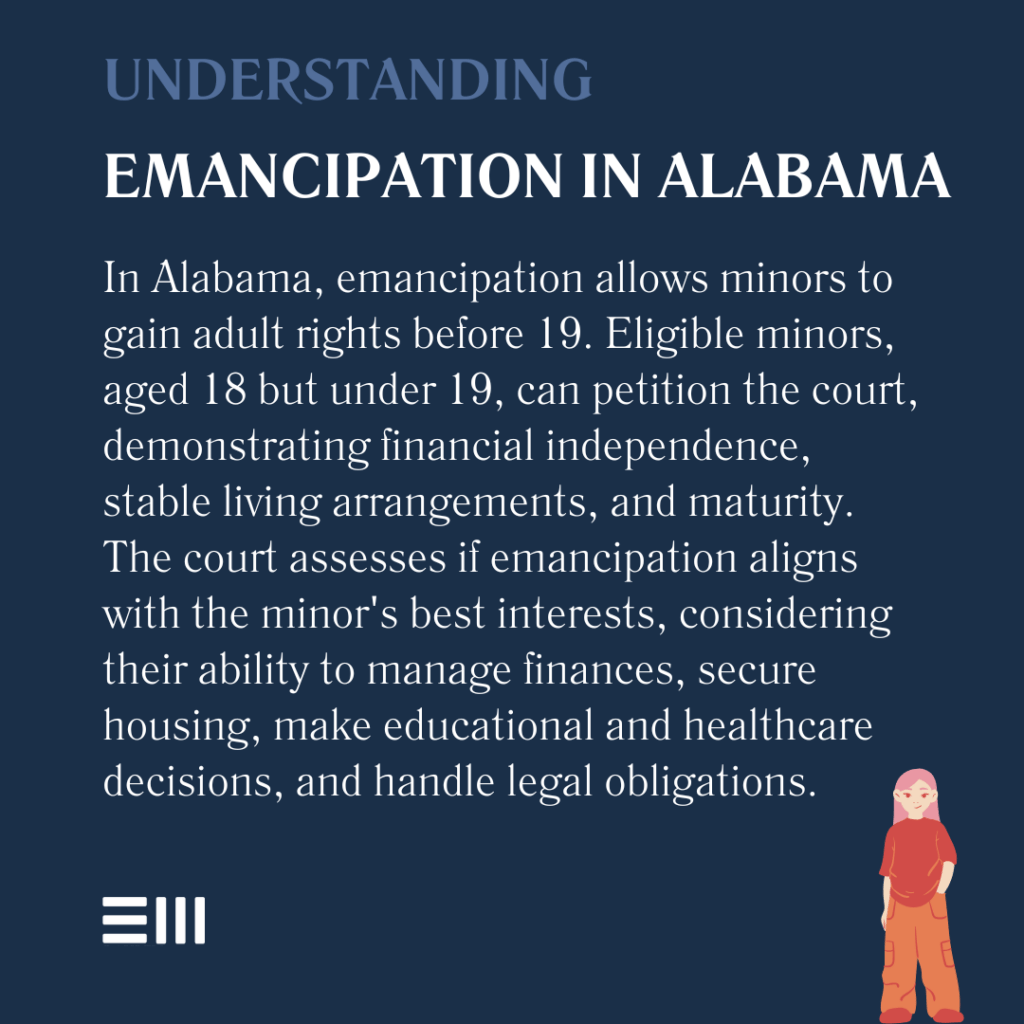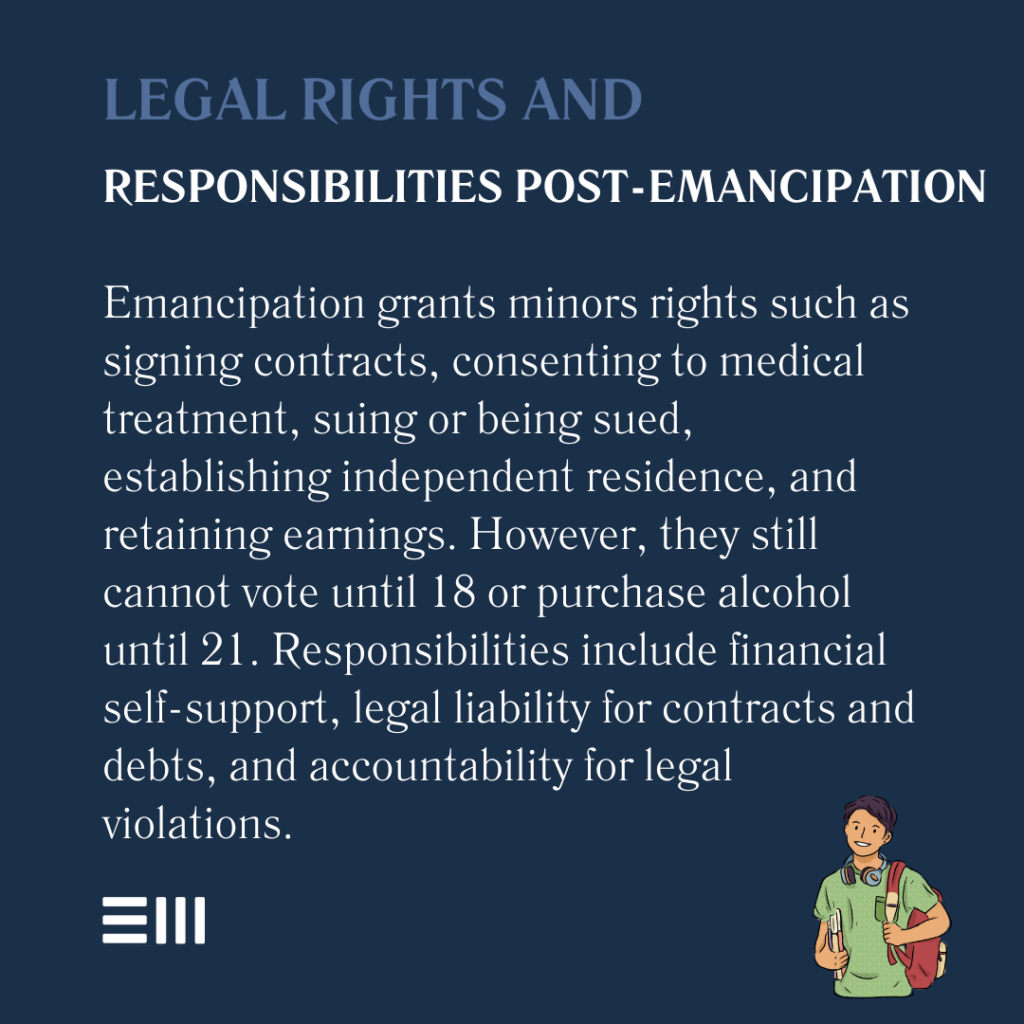
In a small county jail in northern Alabama, 17-year-old Djovani Jean-Pierre marked his birthday behind bars.
For over six months, this Haitian-American teen languished in adult detention, charged as an adult and unable to return to his education.
His situation highlights the stark legal reality many Alabama minors face: without emancipation, they remain subject to Alabama’s complex legal system that can treat them as both children and adults simultaneously—often at the worst possible moments.
Emancipation serves as a legal pathway for minors who need independence before reaching Alabama’s age of majority. When successfully obtained, it grants teenagers the legal rights of adulthood while removing them from parental control and custodial authority.
Understanding Emancipation in Alabama
Emancipation in Alabama is the legal process through which a minor gains most of the rights and responsibilities of adulthood before reaching the standard age of majority (19 in Alabama).
This legal status allows qualified minors to make their own decisions about education, healthcare, employment, and housing without parental consent.
Alabama law specifies that only minors who have reached the age of 18 can petition for emancipation. This creates a narrow window of opportunity for those seeking independence before their 19th birthday.
The court must determine that emancipation serves the minor’s best interests, considering factors such as maturity level, financial independence, and living arrangements.
The legal reality is complex, with courts evaluating each situation individually to determine whether a minor can truly function as an independent adult.
When granted, emancipation fundamentally alters the legal relationship between parent and child.

Requirements for Emancipation in Alabama
To navigate the emancipation process successfully, minors must meet several specific qualifications:
- Be at least 18 years old but younger than 19;
- Demonstrate financial independence and ability to support themselves;
- Have a stable living situation separate from parents;
- Show sufficient maturity to handle adult responsibilities; and
- Provide evidence that emancipation serves their best interests.
Alabama courts carefully scrutinize these requirements to ensure the minor is genuinely prepared for independence. Judges look beyond basic qualifications to assess whether the petitioner can realistically manage adult responsibilities, including:
- Managing finances and maintaining employment;
- Securing housing and utilities;
- Making educational and healthcare decisions; and
- Handling legal obligations and contracts.
Meeting these requirements demands thorough documentation and preparation. Alabama courts prioritize the minor’s best interests above all other considerations.
The Step-by-Step Legal Process
Obtaining emancipation in Alabama involves a structured legal process with multiple stages:
- Prepare the petition: Draft a formal request to the court with all relevant information about your circumstances and reasons for seeking emancipation
- File in the appropriate court: Submit your petition to the family court or juvenile court in your county of residence
- Pay filing fees: Cover court costs or request a fee waiver if you qualify for financial hardship
- Attend the hearing: Present your case before a judge, bringing supporting documentation and witnesses
- Receive the court’s decision: The judge will either grant or deny emancipation based on evidence presented
The timeline for this process varies by county and case complexity. Some straightforward cases resolve in a few weeks, while contested situations may take months.
Throughout this process, the court focuses on determining whether emancipation truly serves the minor’s best interests.
Legal representation is not required but highly recommended to navigate this complex process effectively. Many organizations offer legal assistance specifically for minors seeking emancipation.
Legal Rights and Responsibilities After Emancipation
Emancipation fundamentally transforms a minor’s legal status, granting both freedoms and obligations:
- Rights gained: The ability to sign contracts, consent to medical treatment, sue and be sued, establish independent residence, and retain earnings from employment.
- Rights not gained: Voting (until age 18), purchasing alcohol (until age 21), and other age-restricted activities.
- Responsibilities assumed: Financial self-support, legal liability for contracts and debts, and accountability for legal violations.
This new legal status creates a significant shift in how the law views the emancipated minor. Cases like Anderson v. Loper demonstrate that Alabama courts recognize emancipation as a complete severance of parental authority and financial responsibility.
Emancipated minors must understand they can no longer rely on parents for financial support or healthcare coverage. They become fully responsible for their welfare, housing, education, and legal obligations.

Impact on Parental Rights and Responsibilities
Emancipation creates significant changes for parents as well as minors:
- Termination of child custody and control rights;
- End of financial support obligations;
- Release from legal liability for the minor’s actions;
- Cessation of educational decision-making authority; and
- Elimination of medical consent requirements.
Parents should understand that emancipation permanently alters their legal relationship with their child. Courts do not grant emancipation lightly, recognizing these substantial consequences.
The termination of support obligations represents one of emancipation’s most significant impacts.
Alabama courts have consistently held that once a minor is legally emancipated, parents no longer bear responsibility for providing financial support, educational expenses, or healthcare coverage.
Common Challenges and Considerations
The emancipation process presents several potential obstacles:
- Parental opposition: Parents may contest the emancipation petition, requiring stronger evidence of independence.
- Financial stability concerns: Courts scrutinize income sources and sustainability of employment.
- Housing arrangements: Temporary or unstable housing situations can undermine petitions.
- Educational plans: Judges consider whether emancipation supports or hinders educational goals.
- Healthcare access: Courts evaluate how the minor will maintain insurance coverage and access medical care.
Each of these challenges requires careful planning and documentation to overcome. Successful petitioners typically demonstrate they’ve considered these factors thoroughly and developed practical solutions for each potential issue.
Judges may deny petitions when they believe emancipation could create more problems than it solves. They prioritize long-term stability over short-term independence.
Frequently Asked Questions About Emancipation for Minors in Alabama
Many minors and parents seek answers to common questions about Alabama’s emancipation process.
The following questions address the most common concerns and misconceptions.
What’s the Minimum Age to Seek Emancipation in Alabama?
In Alabama, minors must be at least 18 years old to petition for emancipation, unlike some states that allow younger teens to apply. This requirement stems from §26-13-1 of the Alabama Code, which specifies that emancipation is only available to those who have reached 18 but are still under the age of majority (19).
Can Emancipation Be Reversed in Alabama?
Once granted, emancipation generally cannot be reversed. The court’s decision permanently alters the minor’s legal status. This permanence underscores why courts thoroughly evaluate each petition to ensure the minor is genuinely prepared for independence.
Does Emancipation End Child Support Obligations?
Yes, emancipation typically terminates a parent’s obligation to pay child support. As established in Anderson v. Loper (689 So.2d 118), once a minor is legally emancipated, they are considered self-supporting, releasing parents from financial responsibility.
Can an Emancipated Minor Still Attend Public School?
Emancipated minors retain the right to public education. In fact, many successfully balance education with employment and independent living. Schools typically work with emancipated students to accommodate their unique situations.
How Does Emancipation Affect Healthcare Decisions?
Emancipation grants minors the right to make their own healthcare decisions, including consenting to treatment and accessing medical records. However, it also means losing coverage under parental insurance plans, requiring independent coverage arrangements.
Take the Next Step Toward Independence With Expert Guidance
The path to emancipation involves complex legal considerations that can shape your future. Our experienced family law team understands the challenges minors face when seeking independence and the unique circumstances that lead to this significant decision.
Don’t navigate this life-changing process alone. Our attorneys bring decades of experience in Alabama family law and a commitment to protecting your best interests. We’ll guide you through each step, from preparing your petition to representing you in court proceedings.
Contact Baxley Maniscalco today for a confidential consultation about your emancipation case. Our compassionate approach and legal expertise ensure you’ll have the strongest possible advocacy during this important transition.
Can't find what you're looking for? Search our site below.










